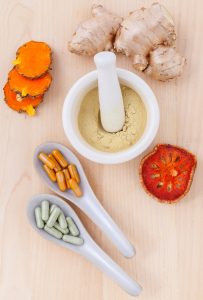 According to recent research, more than 60% of the 1.8 billion Muslims around the world consume nutraceuticals in some form daily.1 Nutraceuticals are products that provide health benefits in addition to their nutritional value. They are thought to improve overall health, delay the aging process, prevent chronic diseases and increase life expectancy. They can be in the form of fortified foods and beverages or dietary supplements. In 2016 the global nutraceutical market was valued at nearly $200 billion. Not all nutraceuticals are halal, however.
According to recent research, more than 60% of the 1.8 billion Muslims around the world consume nutraceuticals in some form daily.1 Nutraceuticals are products that provide health benefits in addition to their nutritional value. They are thought to improve overall health, delay the aging process, prevent chronic diseases and increase life expectancy. They can be in the form of fortified foods and beverages or dietary supplements. In 2016 the global nutraceutical market was valued at nearly $200 billion. Not all nutraceuticals are halal, however.
Halal, translated as “lawful” or “permitted”, is a set of dietary guidelines based on the Qur’an. By definition, halal foods (which include dietary supplements and vaccines) are “free from any component that Muslims are prohibited from consuming according to Islamic law” and “processed, made, produced, manufactured and/or stored using utensils, equipment and/or machinery that have been cleansed according to Islamic law.”2 Many nutraceuticals contain beta-carotene, gelatin, stearates, glycerine, enzymes, emulsifiers and flavors that may be derived from unpermitted, or haram, ingredients such as pork. However, companies can substitute plant, fish or other permissible foods in the manufacture of these ingredients in order to make them halal and permissible for Muslims to consume.
Vaccines have become less popular among Muslims as evidenced by several outbreaks of preventable diseases such as polio, pertussis, and measles in majority Muslim countries in recent years. While some of the hesitancy about vaccines is due to misinformation spread by social media and influential celebrities, a majority of parents who fail to vaccinate their children cite concerns about the vaccines not being halal. Islamic law, however, does recognize that in dire and necessary circumstances, necessity outweighs prohibitions. “The Fatwa Council in Malaysia and internationally have ruled that vaccination is permissible for the purpose of treatment and prevention, and refusing vaccinations will result in greater harm.”3 Before 2018, there were no halal-certified vaccines available globally. The pharmaceutical company AJ Pharma Holding Sdn Bhd is expected to open a facility in Malaysia sometime in 2018 that will create halal vaccines and export them around the world. According to the company, the worldwide halal vaccine market will be worth between $1.3 billion and $1.4 billion by 2020. Overall, the global vaccine market, of which the halal vaccine market is a part, is expected to reach $34.7 billion in 2020, according to Evaluate Pharma.
Today’s market size shows the expected revenues earned from the sales of halal nutraceuticals and vaccines in 2018 and 2023 worldwide. Leading companies in these industries include Abbott Laboratories, AJ Biologics Sdn Bhd, PT Kalbe Farma Tbk, Amway, NoorVitamins, Chemical Company of Malaysia Berhad, Agropur Inc. and Kotra Pharma (M) Sdn Bhd.
1 “Halal Guidelines,” Halal International Certification Pvt Ltd., 2016.
2 “What is Halal? A Guide for Non-Muslims,” Islamic Council of Victoria.
3 Ali Ahmed, et. al., “Outbreak of Vaccine-Preventable Diseases in Muslim Majority Countries,” Journal of Infection and Public Health, March-April 2018, pages 153-155.
Geographic reference: World
Year: 2018 and 2023
Market size: $39.3 billion and $81.2 billion
Sources: Stefan Marwa, “Global Halal Nutraceuticals & Vaccines Market Size to Worth USD 81,207 Million by 2023,” Healthcare Journal, April 9, 2018 available online here; “Halal Guidelines,” Halal International Certification Pvt Ltd., 2016 available online here; Conrad Hackett and David McClendon,” Christians Remain World’s Largest Religious Group, But They Are Declining in Europe,” Pew Research Center, April 5, 2017 available online here; Hamid Nasri, et. al., “New Concepts in Nutraceuticals as Alternative for Pharmaceuticals,” International Journal of Preventative Medicine, December 2014, pages 1487-1499 available online here; “What is Halal? A Guide for Non-Muslims,” Islamic Council of Victoria available online here; Ali Ahmed, et. al., “Outbreak of Vaccine-Preventable Diseases in Muslim Majority Countries,” Journal of Infection and Public Health, March-April 2018, pages 153-155 available online here; Salama, “AJ Pharma to Turn Malaysia into Halal Vaccine Hub,” Halal Focus, January 6, 2018 available online here; Pearl Liu, “Annual Hajj Points to Untapped, Growing Halal Vaccines Market,” BioWorld available online here; and “Global Nutraceuticals Industry Report: 2017-2021 – Analysis of the Multi-Billion Functional Food and Beverage Industries – Research and Markets,” PR Newswire Press Release, March 13, 2017 available online here.
Image source: kerkanno, “acupuncture-alternative-aroma-906144,” Pixabay, August 28, 2015 available online here.
